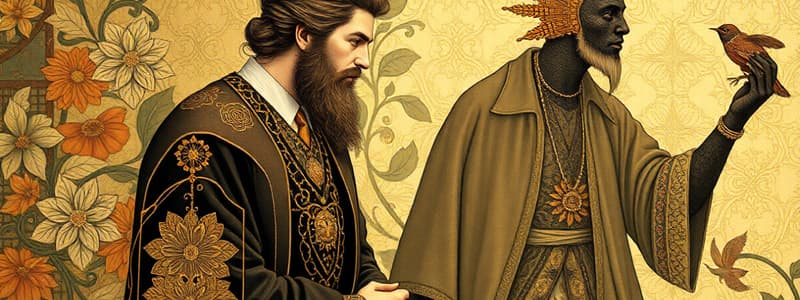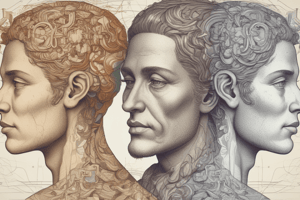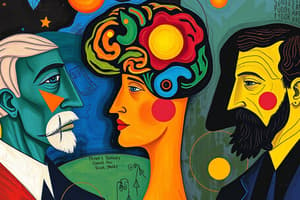Podcast
Questions and Answers
Who is known as the founder of psychoanalysis?
Who is known as the founder of psychoanalysis?
- Sigmund Freud (correct)
- Carl Rogers
- Wilhelm Wundt
- Ivan Pavlov
What concept is associated with Abraham Maslow?
What concept is associated with Abraham Maslow?
- Law of Effect
- Cognitive Development
- Theory of Observational Learning
- Hierarchy of Needs (correct)
Which psychologist introduced the Adaptation of the IQ test in the U.S.?
Which psychologist introduced the Adaptation of the IQ test in the U.S.?
- Charles Spearman
- David Wechsler
- Lewis Terman (correct)
- Alfred Binet
Which theory emphasizes the influence of social and cultural factors on personality across the lifespan?
Which theory emphasizes the influence of social and cultural factors on personality across the lifespan?
What does Howard Gardner's theory of Multiple Intelligences propose?
What does Howard Gardner's theory of Multiple Intelligences propose?
Which psychologist is associated with the concept of the Law of Effect?
Which psychologist is associated with the concept of the Law of Effect?
What is the focus of Albert Bandura's work?
What is the focus of Albert Bandura's work?
What did George Miller discover about short-term memory?
What did George Miller discover about short-term memory?
Which psychologist's work is primarily associated with the concept of emotional intelligence?
Which psychologist's work is primarily associated with the concept of emotional intelligence?
What concept is Jean Piaget best known for?
What concept is Jean Piaget best known for?
Flashcards
Wilhelm Wundt
Wilhelm Wundt
The founder of psychology, known for establishing the first experimental psychology lab.
Sigmund Freud
Sigmund Freud
A psychologist known for developing psychoanalysis, a method used to explore the unconscious mind.
Behaviorism
Behaviorism
A school of psychology that focuses on observable behaviors and how they are learned.
Abraham Maslow
Abraham Maslow
Signup and view all the flashcards
Law of Effect
Law of Effect
Signup and view all the flashcards
Observational Learning
Observational Learning
Signup and view all the flashcards
George Miller
George Miller
Signup and view all the flashcards
Jean Piaget
Jean Piaget
Signup and view all the flashcards
Elisabeth Kubler-Ross
Elisabeth Kubler-Ross
Signup and view all the flashcards
David Wechsler
David Wechsler
Signup and view all the flashcards
Study Notes
Psychology Pioneers and Theories
- Wilhelm Wundt: Founder of psychology
- Sigmund Freud: Founder of psychoanalysis
- Ivan Pavlov, B.F. Skinner, and John Watson: Behaviorism
- Carl Rogers: Founder of Humanistic Psychology
- Abraham Maslow: Developed the theory of motivation
- Edward Lee Thorndike: Law of effect
- Albert Bandura: Observational learning
- George Miller: Short-term memory capacity is limited
- Alexander Thomas and Stella Chess: Temperament research (easy, difficult, slow-to-warm-up)
- Mary D. Salter Ainsworth: Strange situation experiment on attachment
- Noam Chomsky: Infants are capable of language acquisition
- Jean Piaget: Cognitive development with 4 stages
- Erik Erikson: Importance of social and cultural influences on personality development throughout life
- Elisabeth Kubler-Ross: Theory of dying and death
- Deci and Ryan: Self-determination theory and the importance of activity growth
- David Wechsler: Defined intelligence as the global capacity to think rationally and deal effectively with the environment
Intelligence and Measurement
- Alfred Binet: Developed a test to identify students needing help, focused on mental age
- Lewis Terman: Adapted Binet's test and developed the IQ
- David Wechsler: Believed IQ scores can be influenced by personality, motivation, cultural factors, and emphasized adult testing (rather than just children)
- Charles Spearman: Intelligence is a general ability
- Louis L. Thurstone: Intelligence is a cluster of abilities (7 primary mental abilities)
- Howard Gardner: Multiple intelligences (ability to solve problems and create valued products)
- Robert Sternberg: 3 forms of intelligence (analytic, creative, practical)
- Albert Bandura: Personality theory emphasizing the importance of observational learning, social experience, and self-efficacy beliefs
Studying That Suits You
Use AI to generate personalized quizzes and flashcards to suit your learning preferences.




